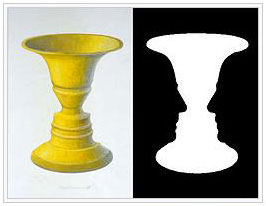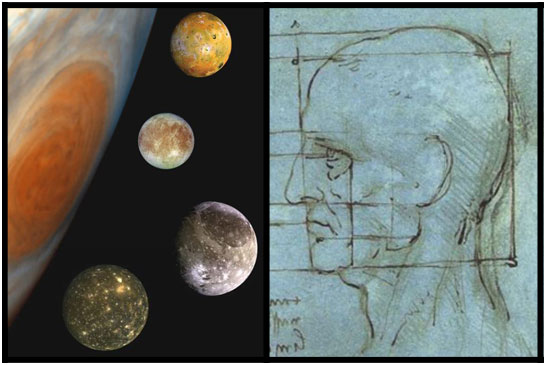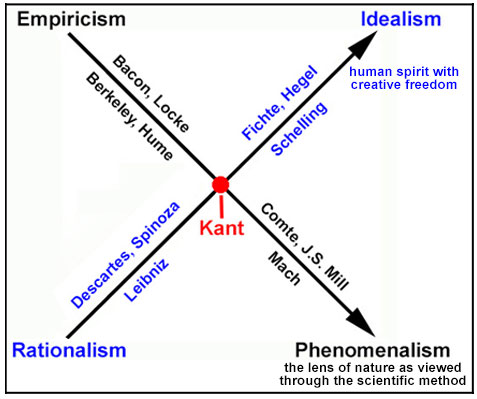Empiricism vs. Rationalism Empiricism and Rationalism are theories on the sources of knowledge. From antiquity to the scientific revolutions of the 17th century, man understood the world upon ideas put forward by the Greek philosopher Aristotle and the world view of the Bible. Such an outlook was based on tradition and authority, rather than experiment and reason. For example, Aristotle believed
that: Modern science dates back to the intellectual movement called the Enlightenment which replaced religious belief with reason and senses to understand the world. Modern science uses theory (reason) and experiment (senses) to understand reality. The folks in the ‘senses’ camp are known as the Empiricists and the folks in the ‘reason’ camp are known as Rationalist. The two labels are useful in that they represent the two extreme poles in how knowledge is acquired. The dispute between empiricism and rationalism takes place within epistemology, the branch of philosophy devoted to studying the nature, the sources and the limits of knowledge. As theories of knowledge, empiricism and rationalism oppose other theories of knowledge, such as idealism and historicism, in the sense that empiricism and rationalism are individualist theories of knowledge, whereas historicism is a social epistemology (the collective). While historicism also acknowledges the role of experience, it differs from empiricism by assuming that sensory data cannot be understood without considering the historical and cultural circumstances in which observations are made. In general, the Sociological Theorist attempts to ask: “What is it doing?" (individual-external view), whereas the Social (Cultural) Theorist attempts to ask: “What does itmean?"(collective-internal view). Empiricism
Sextus Empiricus (160-c210CE), a Pyrrhonian skeptic, raised concerns which applied to all types of knowledge. He doubted the validity of induction (‘bottom-up’ thinking), long before its best known critic David Hume, and raised the infinite regress argument against all forms of reasoning: "...if [a judge of truth] has been approved, that which approves it, in turn, either has been approved or has not been approved, and so on ad infinitum". If an infinite regress argument is valid then Sextus Empiricus advises that we should suspend judgment about virtually all beliefs. Ancient Philosophy professor Michael Frede (1940-2007) advanced an interpretation, contrary to other scholars of ancient philosophy, that Sextus did allow belief, so long as they are not derived by reason, philosophy or speculation. The important difference between the skeptic and the dogmatist is that the skeptic does not hold his beliefs as a result of rigorous philosophical investigation. Empiricism asserts that knowledge can be only attained through the senses alone. Also known as “a posteriori” (after experience) knowledge. Empiricism fits well with the scientific method that all hypotheses and theories must be tested against observation and evidence of the natural world, however it is challenged to account for certain types of knowledge, such as knowledge of pure mathematics or ethics (right and wrong, good and evil). There are almost as many empiricisms as there are empiricists. The range of empiricist positions is vast, from the shocking view that all we can think or know about are our sensations to the claim that experience plays a role in concept development in the light of justifying a belief. Plato disdained empiricism on the grounds that observation can only provide information about a realm of mere appearances. Key to understanding Plato are his concepts of the ‘generalities’ and his belief in The Forms (Ideals). Plato represents mankind’s earliest ponderings on the ascendant drive from matter to spirit. Empiricism is most strongly associated with three British philosophers of the 17th and 18th centuries – John Locke, Bishop George Berkeley and David Hume. In general, Berkeley attemped to purify Locke’s view and Hume attempted to purify Berkeley’s view. Locke and Hume appealed to Newton's achievements in physics for inspiration. Newton’s seminal works in celestial mechanics, optics and gravity effectively launched the Enlightenment, the Age of Reason, the scientific revolution – the rise of empiricism also known as the ‘dignity’of modernity. There is near consensus among researchers that studies should be empirical and not entirely based on its historical past. That Empiricism as a concept competes with other ideas of getting knowledge or how to do studies. Empiricism’s trademark is to let observational data “speak for themselves”, while competing views challenge this position. The enduring tricky problem for empiricism is providing a “nonarbitrary distinction between what is observable and what is not”. Contemporary
Philosophy The term ‘rationalism’ is from the Latin ratio, meaning reason. Rationalism asserts that knowledge can be only attained through pure thinking or reasoning alone. Also known as a priori (prior to experience) knowledge – that some ideas are truly independent of experience. The Rationalist takes caution with the idea
that knowledge can only come from the senses. They are well aware that the senses could mislead by illusion
and deception: For this reason, they argued that knowledge
which is independent of experience must be more trustworthy because it has less to do with the
senses. A
priori knowledge examples include: Rationalists hold that at least some of our knowledge is derived from reason alone, and that reason plays an important role in the acquisition of all of our knowledge. There is clearly a limit to what we can learn through abstract thought, but the rationalist’s claim is that reason play a role in observation, and so that the mind is more fundamental than the senses in the process of knowledge-acquisition. A priori test question: “could it be another way?” If yes, then it is not a priori. Saying that you like red wine is not an a priori truth, because the subject (you) needs to be asked. That knowledge (liking red wine), is a posteriori knowledge because it comes after the experience. According to Rationalism a priori knowledge is absolute, where absolute truth cannot have a situation in where it can be false. Besides using reason as the foundation of knowledge, Rationalism also uses innate knowledge. Innate ideas are often called “ideas present from birth”. Innate ideas can theoretically be discovered or ‘brought out’ (the original meaning of the word ‘education’). For example, one of Descartes’ arguments for the existence of God is that the idea is present in the mind from birth, left there almost as if an artist had signed his work. Descartes’ argument proposes that God is an ‘infinite being or force’ could not have arisen from a finite being (such as people are). That “a cause must have as much reality as its effect” – whatever has produced this idea must share in some way in the quality of the idea. In other words, when we see an effect, we would expect the cause to be something capable of producing it. If a wall displays a bullet hole we would expect the gun which produced it to be powerful enough to make that hole in the wall. In a similar way, Descartes relies on the idea that infinity (something without end, immeasurable) cannot come from something finite (something with an end, measurable). Therefore, God must have been the source of the idea and so He must exist. In this sense, innate ideas are a type of a priori knowledge. To know that they are true, we do not need to conduct a survey or perform an experiment – they are just true. However, although an innate idea is a form of a priori knowledge, not all a priori knowledge is innate. This is because an innate idea is present from birth. The Greek philosopher Plato validated the theory of innate ideas with the thought experiment of teaching an uneducated boy who had no knowledge of mathematics. Through a questioning process Plato showed that the boy was capable of determining the area of a square – a mathematical truth. For Plato, all knowledge was memory. This was because he held a belief in reincarnation and believed that the soul, before it is reborn, is in touch with the divine source of all knowledge. Then, once it is born, it forgets not only its previous lives but also the knowledge that it once had. However, by a process of education and prompting, the person can be encouraged to remember that knowledge (cell memory). Empiricists do not deny the existence of a priori knowledge, but they do deny the existence of innate ideas. The reason for this is that empiricists consider the mind to be a blank slate or ‘Tabula Rasa’ (Latin for “blank slate”). That is, when we are born our minds are clear of any ideas or impressions. For the Rationalists the mind is like a computer: the hardware already has some functions (innate ideas) before the software (experiences, specific knowledge) is loaded onto it.
Historical Perspective:
Medieval
Worldview To get a better understanding of ‘empiricism’ and ‘rationalism’ and a clear sense of our modern minds, a reexamination of our historical culture is helpful. In the medieval days the worldviews of art (Beauty), science (Truth) and morals (Goodness) were all 'fused' with each other. An example of this worldview ‘fusion’ is illustrated in how medieval society justified Galileo’s discovery of the moons of Jupiter: “There are seven windows given to animals in the domicile of the head, through which air is admitted to the tabernacle of the body, to enlighten, to warm, and to nourish it. What are these parts of the micorcosm? Two nostrils, two eyes, and a mouth. So in the heavens, as in a macrocosmos, there are two favorable stars, two unpropitious, two luminaries, and Mercury undecided and indifferent. From this and many other similarities in nature, such as the seven metals, we gather that the number of planets is necessarily seven.” In short, medieval minds were saying “seven bodily orifices means that here must be seven planets.” What’s to be made of this medieval mind worldview? In ‘Brief History of Everything’, integral philosopher Ken Wilber provides an insightful interpretation with the aid of his AQAL model: the objective domain (outside) and the subjective domain (inside) are ‘fused’ with each other – both individualistically and culturally. An example of subjective and cultural fusion: if you disagreed with Church religion (cultural) you were not just a heretic you were also a political criminal. You were tried by the Church for heresy and by the State for treason. What happens in one domain governs what happens in the other. The rise of the scientific revolution, the Age of Reason, the Enlightenment – the empirical outlook – gave mankind a quantum leap in human capacity: the differentiation of art, science and morals. Known as the ‘dignity’ of modernity. ‘Dignity’ because the Art (Beauty), Science (Truth) and Morals (Goodness) could pursue their own knowledge without violent intrusions from the other domains. You could look through Galileo’s telescope without being burned at the stake. Using the AQAL model, this differentiation of self or Mind (I), Nature (It) and Culture (We) contributes to all the benefits we know to be ‘modern’: the rise of democracy (right to vote), of liberation movements (women, slaves), of cultural movements (feminism, abolition). The rise of science, medicine (increase of average life span of almost three decades), physics, biology and ecology because truth was no longer subservient to state and church dogma. Troubles began when Science (Truth) overran the domains of Religion (Goodness) and the Arts (Beauty) with its extraordinary gains in empirical study – by Galileo, Kepler, Newton – which were matched by massive transformations made possible by industrialization. The domains of Goodness and Beauty were pushed to the periphery and ‘Truth’ adopted a mechanistic view of how the universe worked. Empirical Truth had two powerful forces on its side – the accomplishments of empirical science and the power of industrialization. And that power often led early science to become scientism, where science didn’t just pursue their own truths, they aggressively denied that there were any other truths at all. That there is no real Spirit, there is no real mind, there is only empirical nature. The early Enlightenment philosophers denied Spirit, whereas the early Romantics claimed nature is Spirit. The Romantics desired wholeness, harmony and union. They were extremely uneasy with Enlightenment’s repressive tendencies. On the other hand, Enlightenment’s criticism of the Romantics is that they perpetuate tribal regression (eg, ‘get back to nature’, ‘the oak is a crime against the acorn’). Wilber summaries, “To reconcile these two positions – to transcend nature so as to find moral freedom and autonomy (Fichte) or become one with nature so as to find unity and wholeness (Spinoza) – still the critical dilemma in today’s world.” The Kantian
Bridge The visual diagram below illustrates the trajectories of philosophical traditions from the 17th-century to the 19th-century and Kant’s place in it.
The Rationalist tradition of the European continental philosophers (Descartes, Spinoza, Leibniz) or "Continental Rationalism” grew into what is called ‘idealism’ or ‘metaphysical idealism’ or ‘German Idealism’ (Johann Fichte, Friedrich Schelling, Georg Hegel). Idealism’s theme: look at reality through the lens of human self-awareness; of the human spirit with creative freedom. The Empirical tradition of English-speaking philosophers (Bacon, Locke, Berkeley, Hume) grew into what is called ‘phenomenology’ largely represented in the writings of Auguste Comte, John Stuart Mill and Ernest Mach. Phenomenology’s theme: scientific criteria or the scientific method should be used in judging human knowledge.
z |



